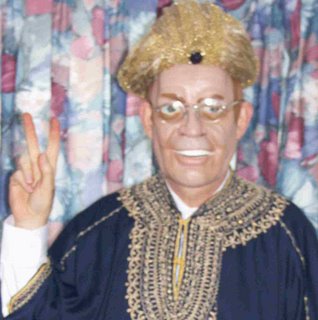Stagflation is a period of rising rates of inflation and rising unemployment rates (or, more generally, economic stagnation or slowdown).
The slowly rising oil prices over the past year, combined with the oil price spike of September and the huge fiscal deficits in the U.S., along with rapid monetary growth in Canada have led many people to become concerned about the possiblility of growing inflation rates in both countries. Even though oil prices have abated from their September peaks, they are still considerably higher than they were a year ago, and there is good reason to be concerned that these higher energy prices will show up as higher costs and higher prices for other products thus raising the core rate of inflation in the near future.
At the same time, in Canada the unemployment rate is at an long-time low. And in the U.S., the unemployment rate, distorted by so much upheaval after Katrina, Rita, and Wilma, is probably a bit on the low side, too. What I mean by "on the low side" is that the unemployment rates are quite likely below the natural unemployment rates [or NAIRU, depending on
which macro model you prefer] in both countries. If I am correct in this assessment, then,
ceteris paribus, we should expect unemployment rates to rise, slightly, in both countries.
These two forces, contrary to the naive, short-run Phillips Curve, indicate that over the next year or so we should experience rising inflation rates and rising unemployment rates -- just a little bit of stagflation. It happens frequently when an economy experiences a supply shock, which has been occurring for the past year as oil prices have been bid up on the world market.
Stephen Poloz agrees:
Central banks are raising interest rates now to reduce the risk of an acceleration in behavioural inflation. Higher interest rates will moderate demand in the economy overall. Non-energy sectors will feel this the most, of course, because the energy sector is booming. The effect on non-energy sectors will be twofold: higher energy costs will drain purchasing power from other sectors, and higher interest rates will drain purchasing power from all sectors.
The result will be a little bit of stagflation, although not the ugly kind we saw back in the 1970s. A combination of slowing growth and rising inflation is a natural consequence of an energy price shock that collides with a cautiously restrictive monetary policy. The situation is nothing like as severe as it was in the 1970s, because inflation is so low today and the economy much healthier.
At the same time,
David Altig points out that the current situation and the assessments of it are much more mixed in the U.S.
My concern is that elected policy makers will not accept as "natural" the future increases in the unemployment rate that I expect are on the horizon. If they do not, monetary authorities will have to remain strong-willed to hold off additional inflationary pressures.



